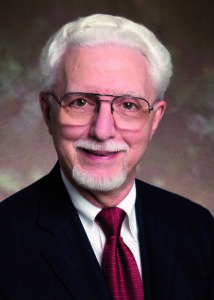
His was the golden age of vascular surgery, said Robert B. Smith III, MD, recipient of this year’s SVS Lifetime Achievement Award. And he enjoyed every moment of it, including getting in on the ground floor of the specialty by training under vascular pioneer Arthur Voorhees, MD, in New York City.
Smith’s work—as surgeon, scientist, teacher, mentor and leader—has left a lasting impact on the vascular world.
Smith interned and did his residency at Columbia Presbyterian Hospital in New York City (interrupted by two years in the Army), where he became immersed in vascular surgery with Voorhees. “My career overlapped with the growth and maturation of vascular surgery as a distinct specialty. It’s amazing what happened in those decades,” he said. And, with the endovascular revolution, “it’s still going on.”
In 1966, Smith returned to Emory University in Atlanta, where he’d attended college and medical school, as a faculty member. He spent the rest of his career there. With his senior partner, Garland Perdue, MD, Smith performed Georgia’s first successful renal transplant. He collaborated with Dean Warren, MD, to help refine the distal splenorenal shunt, a major innovation in the care of patients with portal hypertension. Surgeons from across the country visited Emory to observe the liver team performing shunt procedures.
Smith was the first to describe, in 1977, the creation of an axillo-popliteal bypass and its utility as an extra-anatomic bypass for the management of patients presenting with an infected aortobifemoral bypass. That and many other contributions to the clinical practice of vascular surgery have been reported in more than 225 peer-reviewed publications, as well as four co-edited textbooks.
In 1969, just three years after his return to Emory, he helped launch one of the country’s first accredited vascular surgery fellowship programs. Now in its 50th year, nearly 90 board-certified vascular surgeons have trained there—including a number of SVS members—who are well-respected leaders in vascular surgery in a variety of community and academic settings throughout the U.S. and abroad. Sixty came through during Smith’s tenure, including one now practicing in Egypt.
Those trainees and colleagues heap praise on him, saying he was known as “both a master surgeon and the go-to vascular surgeon at Emory,” and that he actively “recruited and developed surgeon-scientists.”
Besides surgeon, clinician and teacher, he has donned many other hats: in administrative roles, including medical director of Emory University Hospital and associate dean for clinical affairs; in surgical roles, including being on the American College of Surgeons’ Board of Governors and a representative of the College on the Joint Commission, plus involvement in regional and national vascular surgical organizations.
In 1996, as president of the North American Chapter of the International Society for Cardiovascular Surgery, Smith helped James Stanley, MD, then SVS president, to initiate action that eventually resulted in the establishment of the American Board of Vascular Surgery.
“Bob Smith is a thoughtful person, a true gentleman, and one of those individuals who have made us who we are today,” said one surgeon. “Dr. Smith set an example of integrity, humility, compassion and surgical excellence that has had indisputable salutary effects on his many trainees,” another said. “His influence continues to be felt to this day by a new generation being trained by his trainees. It is an honor to be able to pay forward the many lessons learned from Dr. Smith.”
Fellow surgeons also point out that he was way ahead of his time in the quest for work-life balance, now gaining prominence in the SVS via its Wellness Task Force.
“This is something I advised our trainees about over the years,” Smith said. “Vascular surgery can be an all-consuming career. You want to try to arrange your life, if you have a family, so you don’t miss too many recitals and soccer games. Even with my best efforts, I think our kids remember me as an absent dad for many events.”
In fact, despite their laments that “Dad was never home,” all three children have been involved in medicine: daughter Victoria in nursing, son Robert, in management positions related to medicine and youngest Scott Smith as a physician’s assistant in anesthesia, a position that requires on-call work and irregular hours, Smith noted.
“The boys swore for years they’d never be in medicine,” he laughed. Meanwhile, he and wife Flo now enjoy grandchildren and great-grandchildren, all living relatively close by.
He performed an estimated 10,000 procedures during his career. “I really enjoyed patient care. I loved the operating room and surgical procedures. And during the peak of my career, that was the most important business I was involved in,” he said. However, now 10 years into retirement, Smith’s viewpoint has changed. “Now the most satisfying and gratifying were all those marvelous young people we trained,” he said.
“Those 60 have now trained so many other young surgeons that it’s allowed me to touch the lives of people that I’ve never seen or heard of. I think in many ways that is more important than the patients I actually operated on myself.”












